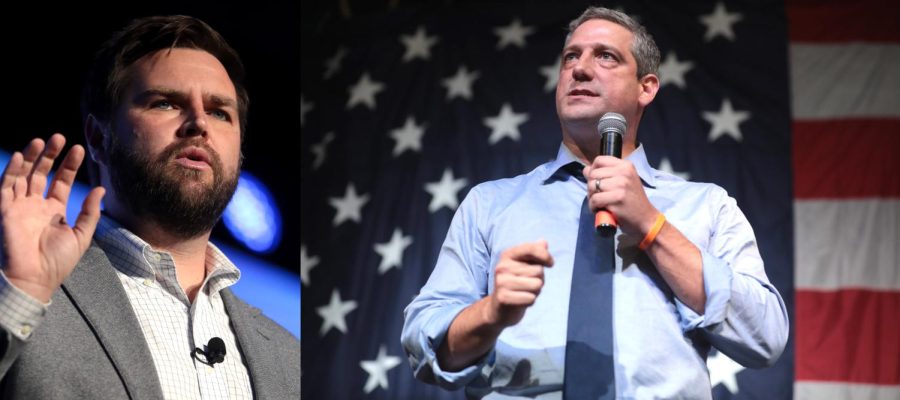Vance and Ryan spar in Senate debates
Republican author and venture capitalist JD Vance (left) and US Rep. Tim Ryan (right) are currently running against each other for Ohio’s vacant US Senate seat.
Oct 21, 2022
One of the most watched and heated elections in the U.S. Senate race is in Ohio between Democrat Tim Ryan and Republican J.D. Vance, who participated in two debates this past week. Going into the debates, Vance holds a small majority over Ryan, 47% to 45%.
The first debate was held on Oct. 10, with the second one following a week later on Oct. 17. Both candidates attacked each other for their political statements on various issues such as abortion, guns and immigration. Ryan made several claims that Vance was too extreme for the average voter, claiming Vance had even founded a fake nonprofit organization, Our Ohio Renewal (in reality, the organization simply failed to fill out initial tax forms). Vance called his claims outrageous and accused Ryan of pretending to be moderate while following closely with the far-left politicians. “I’m running to represent the exhausted majority: Democrats, Republicans and independents,” Ryan said. In his closing remarks, Vance called for a change in leadership and a “fresh start for Ohio”.
In the first debate, “45% said that Vance did better than they expected, while only 35% said Ryan surprised them in his performance.” However, a majority of respondents claimed they did not watch the first debate, but more than half said they would reportedly watch the second debate.
The second debate on Oct. 17, held at a Youngstown TV studio, was more heated than the first, with Ryan claiming, “I think I struck a nerve with this guy” when Vance was insulted by Ryan’s racism accusations. Vance was disgusted by these claims, having fathered three mixed-race children with his wife, Usha Chilukuri Vance.
Vance also attacked Ryan for failing his constituents for the past 20 years of his service. Vance ended his closing remarks by again calling for new leadership for the state of Ohio. Ryan made it clear that he will represent the silent majority and views Vance as an extreme political figure.
“Generally, debates don’t make a huge difference on the outcome of the election,” said Colin Swearingen of the Political Science Department at John Carroll. “Changes in opinion that stem from a debate are typically short-lived.”
Swearingen emphasized the timing of a debate is critical, yet “the growing popularity of early voting complicates this, as people can fill out their ballot while they’re watching the debate.”
Swearingen also highlighted that each candidate always plans the heated rhetoric used within the debate before the debates start, suggesting that it fuels interest in the debates. “[The candidates] prepare specific talking points and barbs in advance and wait to deploy them, knowing that people want to watch something interesting.”














Ruth • Oct 22, 2022 at 9:14 am
Informative and even-handed article.